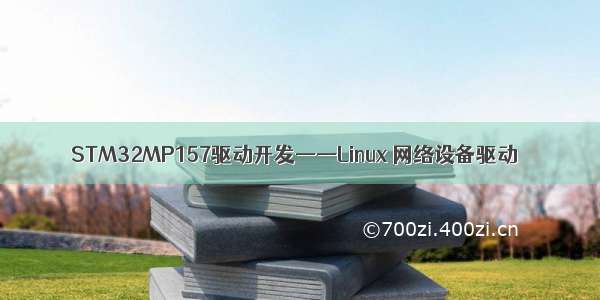
14.1 网络设备驱动结构
网络协议接口层:硬件无关,标准收发函数dev_queue_xmit()和netif_rx();注意,netif_rx是将接收到的数据给上层,有时也在驱动收到数据以后调用。网络设备接口层,net_device,统一接口名称,使上层独立于具体硬件。设备驱动功能层,实现net_device的各成员物理层在整个以太网架构里,有两个数据结构非常重要,即sk_buff和net_device,后面两节有说明。
还有一些与内核交互的函数,需要掌握,如netif_start_queue(),netif_stop_queue(),netif_wakeup_queue(),netif_rx(),netif_carrier_on/off_ok()
14.1.1 sk_buff
以太网各层之间用sk_buff结构体传递数据,该结构体是很多函数的形参。
#include <linux/skbuff.h>/** * struct sk_buff - socket buffer* @next: Next buffer in list* @prev: Previous buffer in list* @tstamp: Time we arrived* @sk: Socket we are owned by* @dev: Device we arrived on/are leaving by* @cb: Control buffer. Free for use by every layer. Put private vars here* @_skb_refdst: destination entry (with norefcount bit)* @sp: the security path, used for xfrm* @len: Length of actual data* @data_len: Data length* @mac_len: Length of link layer header* @hdr_len: writable header length of cloned skb* @csum: Checksum (must include start/offset pair)* @csum_start: Offset from skb->head where checksumming should start* @csum_offset: Offset from csum_start where checksum should be stored* @priority: Packet queueing priority* @local_df: allow local fragmentation* @cloned: Head may be cloned (check refcnt to be sure)* @ip_summed: Driver fed us an IP checksum* @nohdr: Payload reference only, must not modify header* @nfctinfo: Relationship of this skb to the connection* @pkt_type: Packet class* @fclone: skbuff clone status* @ipvs_property: skbuff is owned by ipvs* @peeked: this packet has been seen already, so stats have been* done for it, don't do them again* @nf_trace: netfilter packet trace flag* @protocol: Packet protocol from driver* @destructor: Destruct function* @nfct: Associated connection, if any* @nf_bridge: Saved data about a bridged frame - see br_netfilter.c* @skb_iif: ifindex of device we arrived on* @tc_index: Traffic control index* @tc_verd: traffic control verdict* @rxhash: the packet hash computed on receive* @queue_mapping: Queue mapping for multiqueue devices* @ndisc_nodetype: router type (from link layer)* @ooo_okay: allow the mapping of a socket to a queue to be changed* @l4_rxhash: indicate rxhash is a canonical 4-tuple hash over transport* ports.* @wifi_acked_valid: wifi_acked was set* @wifi_acked: whether frame was acked on wifi or not* @no_fcs: Request NIC to treat last 4 bytes as Ethernet FCS* @dma_cookie: a cookie to one of several possible DMA operations* done by skb DMA functions* @napi_id: id of the NAPI struct this skb came from* @secmark: security marking* @mark: Generic packet mark* @dropcount: total number of sk_receive_queue overflows* @vlan_proto: vlan encapsulation protocol* @vlan_tci: vlan tag control information* @inner_protocol: Protocol (encapsulation)* @inner_transport_header: Inner transport layer header (encapsulation)* @inner_network_header: Network layer header (encapsulation)* @inner_mac_header: Link layer header (encapsulation)* @transport_header: Transport layer header* @network_header: Network layer header* @mac_header: Link layer header* @tail: Tail pointer* @end: End pointer* @head: Head of buffer* @data: Data head pointer* @truesize: Buffer size* @users: User count - see {datagram,tcp}.c*/struct sk_buff {/* These two members must be first. */struct sk_buff *next;struct sk_buff *prev;ktime_t tstamp;struct sock *sk;struct net_device *dev;/** This is the control buffer. It is free to use for every* layer. Please put your private variables there. If you* want to keep them across layers you have to do a skb_clone()* first. This is owned by whoever has the skb queued ATM.*/char cb[48] __aligned(8);unsigned long _skb_refdst;#ifdef CONFIG_XFRMstruct sec_path *sp;#endifunsigned intlen,// data段的长度data_len;__u16 mac_len,hdr_len;union {__wsum csum;struct {__u16 csum_start;__u16 csum_offset;};};__u32 priority;kmemcheck_bitfield_begin(flags1);__u8 local_df:1,cloned:1,ip_summed:2,nohdr:1,nfctinfo:3;__u8 pkt_type:3,fclone:2,ipvs_property:1,peeked:1,nf_trace:1;kmemcheck_bitfield_end(flags1);__be16 protocol;void (*destructor)(struct sk_buff *skb);#if defined(CONFIG_NF_CONNTRACK) || defined(CONFIG_NF_CONNTRACK_MODULE)struct nf_conntrack *nfct;#endif#ifdef CONFIG_BRIDGE_NETFILTERstruct nf_bridge_info *nf_bridge;#endifint skb_iif;__u32 rxhash;__be16 vlan_proto;__u16 vlan_tci;#ifdef CONFIG_NET_SCHED__u16 tc_index; /* traffic control index */#ifdef CONFIG_NET_CLS_ACT__u16 tc_verd; /* traffic control verdict */#endif#endif__u16 queue_mapping;kmemcheck_bitfield_begin(flags2);#ifdef CONFIG_IPV6_NDISC_NODETYPE__u8 ndisc_nodetype:2;#endif__u8 pfmemalloc:1;__u8 ooo_okay:1;__u8 l4_rxhash:1;__u8 wifi_acked_valid:1;__u8 wifi_acked:1;__u8 no_fcs:1;__u8 head_frag:1;/* Encapsulation protocol and NIC drivers should use* this flag to indicate to each other if the skb contains* encapsulated packet or not and maybe use the inner packet* headers if needed*/__u8 encapsulation:1;/* 6/8 bit hole (depending on ndisc_nodetype presence) */kmemcheck_bitfield_end(flags2);#if defined CONFIG_NET_DMA || defined CONFIG_NET_RX_BUSY_POLLunion {unsigned int napi_id;dma_cookie_t dma_cookie;};#endif#ifdef CONFIG_NETWORK_SECMARK__u32 secmark;#endifunion {__u32 mark;__u32 dropcount;__u32 reserved_tailroom;};__be16 inner_protocol;__u16 inner_transport_header;__u16 inner_network_header;__u16 inner_mac_header;__u16 transport_header;__u16 network_header;__u16 mac_header;/* These elements must be at the end, see alloc_skb() for details. */sk_buff_data_ttail;sk_buff_data_tend;unsigned char *head,*data;unsigned int truesize;atomic_t users;};
接收时,各层去掉自己的协议,把数据给上层;发送时,各层添加自己的协议,最终给物理网口。上图指针可以动态调整,下面是若干函数
/**tail后移,即在data中增加数据* skb_put - add data to a buffer* @skb: buffer to use* @len: amount of data to add** This function extends the used data area of the buffer. If this would* exceed the total buffer size the kernel will panic. A pointer to the* first byte of the extra data is returned.*/unsigned char *skb_put(struct sk_buff *skb, unsigned int len){unsigned char *tmp = skb_tail_pointer(skb);SKB_LINEAR_ASSERT(skb);skb->tail += len;skb->len += len;if (unlikely(skb->tail > skb->end))skb_over_panic(skb, len, __builtin_return_address(0));return tmp;}/***skb_push - add data to the start of a buffer,data前移* @skb: buffer to use* @len: amount of data to add** This function extends the used data area of the buffer at the buffer* start. If this would exceed the total buffer headroom the kernel will* panic. A pointer to the first byte of the extra data is returned.*/unsigned char *skb_push(struct sk_buff *skb, unsigned int len){ skb->data -= len;skb->len += len;if (unlikely(skb->data<skb->head))skb_under_panic(skb, len, __builtin_return_address(0));return skb->data;}/*** skb_pull - remove data from the start of a buffer,data后移* @skb: buffer to use* @len: amount of data to remove** This function removes data from the start of a buffer, returning* the memory to the headroom. A pointer to the next data in the buffer* is returned. Once the data has been pulled future pushes will overwrite* the old data.*/unsigned char *skb_pull(struct sk_buff *skb, unsigned int len){return skb_pull_inline(skb, len);}static inline unsigned char *skb_pull_inline(struct sk_buff *skb, unsigned int len){return unlikely(len > skb->len) ? NULL : __skb_pull(skb, len);}static inline unsigned char *__skb_pull(struct sk_buff *skb, unsigned int len){skb->len -= len;BUG_ON(skb->len < skb->data_len);return skb->data += len;}
/*** skb_reserve - adjust headroom* @skb: buffer to alter* @len: bytes to move** Increase the headroom of an empty &sk_buff by reducing the tail* room. This is only allowed for an empty buffer.*/static inline void skb_reserve(struct sk_buff *skb, int len){ skb->data += len;skb->tail += len;}
// 例子:
skb=alloc_skb(len+headspace, GFP_KERNEL);// 分配
skb_reserve(skb, headspace); // tail=data=起始位置+headspace
skb_put(skb,len);// tail += len
memcpy_fromfs(skb->data,data,len);
pass_to_m_protocol(skb);
sk_buff的动态分配和释放
static inline struct sk_buff *alloc_skb(unsigned int size,gfp_t priority);/* legacy helper around netdev_alloc_skb() */static inline struct sk_buff *dev_alloc_skb(unsigned int length);void kfree_skb(struct sk_buff *skb);
void dev_kfree_skb)(struct sk_buff * skb);/** It is not allowed to call kfree_skb() or consume_skb() from hardware* interrupt context or with hardware interrupts being disabled.* (in_irq() || irqs_disabled())** We provide four helpers that can be used in following contexts :** dev_kfree_skb_irq(skb) when caller drops a packet from irq context,* replacing kfree_skb(skb)** dev_consume_skb_irq(skb) when caller consumes a packet from irq context.* Typically used in place of consume_skb(skb) in TX completion path** dev_kfree_skb_any(skb) when caller doesn't know its current irq context,* replacing kfree_skb(skb)** dev_consume_skb_any(skb) when caller doesn't know its current irq context,* and consumed a packet. Used in place of consume_skb(skb)*/static inline void dev_kfree_skb_irq(struct sk_buff *skb);static inline void dev_kfree_skb_any(struct sk_buff *skb);
14.1.2 net_device
net_device有点类似字符设备中的file_opretions,里面定义了很多标准成员函数,驱动需要实现里面的函数。
/** The DEVICE structure.* Actually, this whole structure is a big mistake. It mixes I/O* data with strictly "high-level" data, and it has to know about* almost every data structure used in the INET module.** FIXME: cleanup struct net_device such that network protocol info* moves out.*/struct net_device {/** This is the first field of the "visible" part of this structure* (i.e. as seen by users in the "Space.c" file). It is the name* of the interface.*/charname[IFNAMSIZ];/* device name hash chain, please keep it close to name[] */struct hlist_node name_hlist;/* snmp alias */char *ifalias;/** I/O specific fields* FIXME: Merge these and struct ifmap into one*/unsigned longmem_end; /* shared mem end */unsigned longmem_start; /* shared mem start */unsigned longbase_addr; /* device I/O address */intirq; /* device IRQ number *//** Some hardware also needs these fields, but they are not* part of the usual set specified in Space.c.*/unsigned long state;struct list_head dev_list;struct list_head napi_list;struct list_head unreg_list;struct list_head close_list;/* directly linked devices, like slaves for bonding */struct {struct list_head upper;struct list_head lower;} adj_list;/* all linked devices, *including* neighbours */struct {struct list_head upper;struct list_head lower;} all_adj_list;/* currently active device features */netdev_features_t features;/* user-changeable features */netdev_features_t hw_features;/* user-requested features */netdev_features_t wanted_features;/* mask of features inheritable by VLAN devices */netdev_features_t vlan_features;/* mask of features inherited by encapsulating devices* This field indicates what encapsulation offloads* the hardware is capable of doing, and drivers will* need to set them appropriately.*/netdev_features_t hw_enc_features;/* mask of fetures inheritable by MPLS */netdev_features_t mpls_features;/* Interface index. Unique device identifier */int ifindex;int iflink;structnet_device_statsstats;// 各种统计信息atomic_long_t rx_dropped; /* dropped packets by core network* Do not use this in drivers.*/#ifdef CONFIG_WIRELESS_EXT/* List of functions to handle Wireless Extensions (instead of ioctl).* See <net/iw_handler.h> for details. Jean II */const struct iw_handler_def * wireless_handlers;/* Instance data managed by the core of Wireless Extensions. */struct iw_public_data * wireless_data;#endif/* Management operations */const structnet_device_ops*netdev_ops;// 具体函数,需驱动填充const struct ethtool_ops *ethtool_ops;const struct forwarding_accel_ops *fwd_ops;/* Hardware header description */const struct header_ops *header_ops;unsigned intflags; /* interface flags (a la BSD) ,接口标记,以IFF_开头,说明设备接口的能力和特性*/unsigned int priv_flags; /* Like 'flags' but invisible to userspace.* See if.h for definitions. */unsigned short gflags;unsigned short padded; /* How much padding added by alloc_netdev() */unsigned char operstate; /* RFC2863 operstate */unsigned char link_mode; /* mapping policy to operstate */unsigned char if_port; /* Selectable AUI, TP,..*/unsigned char dma; /* DMA channel */unsigned intmtu; /* interface MTU value,最单传输单元 */unsigned shorttype; /* interface hardware type,硬件类型 */unsigned shorthard_header_len; /* hardware hdr length,Dmac+Smac+type=14 *//* extra head- and tailroom the hardware may need, but not in all cases* can this be guaranteed, especially tailroom. Some cases also use* LL_MAX_HEADER instead to allocate the skb.*/unsigned short needed_headroom;unsigned short needed_tailroom;/* Interface address info. */unsigned char perm_addr[MAX_ADDR_LEN]; /* permanent hw address */unsigned char addr_assign_type; /* hw address assignment type */unsigned char addr_len; /* hardware address length */unsigned short neigh_priv_len;unsigned shortdev_id; /* Used to differentiate devices* that share the same link* layer address*/spinlock_t addr_list_lock;struct netdev_hw_addr_list uc; /* Unicast mac addresses */struct netdev_hw_addr_list mc; /* Multicast mac addresses */struct netdev_hw_addr_list dev_addrs; /* list of device* hw addresses*/#ifdef CONFIG_SYSFSstruct kset *queues_kset;#endifbool uc_promisc;unsigned int promiscuity;unsigned int allmulti;/* Protocol specific pointers */#if IS_ENABLED(CONFIG_VLAN_8021Q)struct vlan_info __rcu *vlan_info; /* VLAN info */#endif#if IS_ENABLED(CONFIG_NET_DSA)struct dsa_switch_tree *dsa_ptr; /* dsa specific data */#endif#if IS_ENABLED(CONFIG_TIPC)struct tipc_bearer __rcu *tipc_ptr; /* TIPC specific data */#endifvoid *atalk_ptr; /* AppleTalk link*/struct in_device __rcu *ip_ptr; /* IPv4 specific data */struct dn_dev __rcu*dn_ptr; /* DECnet specific data */struct inet6_dev __rcu *ip6_ptr; /* IPv6 specific data */void *ax25_ptr; /* AX.25 specific data */struct wireless_dev *ieee80211_ptr; /* IEEE 802.11 specific data,assign before registering *//** Cache lines mostly used on receive path (including eth_type_trans())*/unsigned long last_rx; /* Time of last Rx* This should not be set in* drivers, unless really needed,* because network stack (bonding)* use it if/when necessary, to* avoid dirtying this cache line.*//* Interface address info used in eth_type_trans() */unsigned char *dev_addr; /* hw address, (before bcastbecause most packets areunicast) */#ifdef CONFIG_SYSFSstruct netdev_rx_queue *_rx;/* Number of RX queues allocated at register_netdev() time */unsigned int num_rx_queues;/* Number of RX queues currently active in device */unsigned int real_num_rx_queues;#endifrx_handler_func_t __rcu *rx_handler;void __rcu *rx_handler_data;struct netdev_queue __rcu *ingress_queue;unsigned char broadcast[MAX_ADDR_LEN]; /* hw bcast add *//** Cache lines mostly used on transmit path*/struct netdev_queue *_tx ____cacheline_aligned_in_smp;/* Number of TX queues allocated at alloc_netdev_mq() time */unsigned int num_tx_queues;/* Number of TX queues currently active in device */unsigned int real_num_tx_queues;/* root qdisc from userspace point of view */struct Qdisc *qdisc;unsigned long tx_queue_len; /* Max frames per queue allowed */spinlock_t tx_global_lock;#ifdef CONFIG_XPSstruct xps_dev_maps __rcu *xps_maps;#endif#ifdef CONFIG_RFS_ACCEL/* CPU reverse-mapping for RX completion interrupts, indexed* by RX queue number. Assigned by driver. This must only be* set if the ndo_rx_flow_steer operation is defined. */struct cpu_rmap *rx_cpu_rmap;#endif/* These may be needed for future network-power-down code. *//** trans_start here is expensive for high speed devices on SMP,* please use netdev_queue->trans_start instead.*/unsigned long trans_start; /* Time (in jiffies) of last Tx */int watchdog_timeo; /* used by dev_watchdog() */struct timer_list watchdog_timer;/* Number of references to this device */int __percpu *pcpu_refcnt;/* delayed register/unregister */struct list_head todo_list;/* device index hash chain */struct hlist_node index_hlist;struct list_head link_watch_list;/* register/unregister state machine */enum { NETREG_UNINITIALIZED=0,NETREG_REGISTERED, /* completed register_netdevice */NETREG_UNREGISTERING, /* called unregister_netdevice */NETREG_UNREGISTERED, /* completed unregister todo */NETREG_RELEASED, /* called free_netdev */NETREG_DUMMY, /* dummy device for NAPI poll */} reg_state:8;bool dismantle; /* device is going do be freed */enum {RTNL_LINK_INITIALIZED,RTNL_LINK_INITIALIZING,} rtnl_link_state:16;/* Called from unregister, can be used to call free_netdev */void (*destructor)(struct net_device *dev);#ifdef CONFIG_NETPOLLstruct netpoll_info __rcu *npinfo;#endif#ifdef CONFIG_NET_NS/* Network namespace this network device is inside */struct net *nd_net;#endif/* mid-layer private */union {void*ml_priv;struct pcpu_lstats __percpu *lstats; /* loopback stats */struct pcpu_sw_netstats __percpu *tstats;struct pcpu_dstats __percpu *dstats; /* dummy stats */struct pcpu_vstats __percpu *vstats; /* veth stats */};/* GARP */struct garp_port __rcu *garp_port;/* MRP */struct mrp_port __rcu *mrp_port;/* class/net/name entry */struct device dev;/* space for optional device, statistics, and wireless sysfs groups */const struct attribute_group *sysfs_groups[4];/* space for optional per-rx queue attributes */const struct attribute_group *sysfs_rx_queue_group;/* rtnetlink link ops */const struct rtnl_link_ops *rtnl_link_ops;/* for setting kernel sock attribute on TCP connection setup */#define GSO_MAX_SIZE 65536unsigned int gso_max_size;#define GSO_MAX_SEGS 65535u16 gso_max_segs;#ifdef CONFIG_DCB/* Data Center Bridging netlink ops */const struct dcbnl_rtnl_ops *dcbnl_ops;#endifu8 num_tc;struct netdev_tc_txq tc_to_txq[TC_MAX_QUEUE];u8 prio_tc_map[TC_BITMASK + 1];#if IS_ENABLED(CONFIG_FCOE)/* max exchange id for FCoE LRO by ddp */unsigned int fcoe_ddp_xid;#endif#if IS_ENABLED(CONFIG_CGROUP_NET_PRIO)struct netprio_map __rcu *priomap;#endif/* phy device may attach itself for hardware timestamping */struct phy_device *phydev;struct lock_class_key *qdisc_tx_busylock;/* group the device belongs to */int group;struct pm_qos_request pm_qos_req;};
* Standard interface flags (netdevice->flags). */
#define IFF_UP 0x1 /* interface is up */
#define IFF_BROADCAST 0x2 /* broadcast address valid */
#define IFF_DEBUG 0x4 /* turn on debugging */
#define IFF_LOOPBACK 0x8 /* is a loopback net */
#define IFF_POINTOPOINT 0x10 /* interface is has p-p link */
#define IFF_NOTRAILERS 0x20 /* avoid use of trailers */
#define IFF_RUNNING 0x40 /* interface RFC2863 OPER_UP */
#define IFF_NOARP 0x80 /* no ARP protocol */
#define IFF_PROMISC 0x100 /* receive all packets */
#define IFF_ALLMULTI 0x200 /* receive all multicast packets*/
#define IFF_MASTER 0x400 /* master of a load balancer */
#define IFF_SLAVE 0x800 /* slave of a load balancer */
#define IFF_MULTICAST 0x1000 /* Supports multicast */
#define IFF_PORTSEL 0x2000 /* can set media type */
#define IFF_AUTOMEDIA 0x4000 /* auto media select active */
#define IFF_DYNAMIC 0x8000 /* dialup device with changing addresses*/
#define IFF_LOWER_UP 0x10000 /* driver signals L1 up */
#define IFF_DORMANT 0x20000 /* driver signals dormant */
#define IFF_ECHO 0x40000 /* echo sent packets */
#define IFF_VOLATILE (IFF_LOOPBACK|IFF_POINTOPOINT|IFF_BROADCAST|IFF_ECHO|\
IFF_MASTER|IFF_SLAVE|IFF_RUNNING|IFF_LOWER_UP|IFF_DORMANT)
/* Private (from user) interface flags (netdevice->priv_flags). */
#define IFF_802_1Q_VLAN 0x1 /* 802.1Q VLAN device. */
#define IFF_EBRIDGE 0x2 /* Ethernet bridging device. */
#define IFF_SLAVE_INACTIVE 0x4 /* bonding slave not the curr. active */
#define IFF_MASTER_8023AD 0x8 /* bonding master, 802.3ad. */
#define IFF_MASTER_ALB 0x10 /* bonding master, balance-alb. */
#define IFF_BONDING 0x20 /* bonding master or slave */
#define IFF_SLAVE_NEEDARP 0x40 /* need ARPs for validation */
#define IFF_ISATAP 0x80 /* ISATAP interface (RFC4214) */
#define IFF_MASTER_ARPMON 0x100 /* bonding master, ARP mon in use */
#define IFF_WAN_HDLC 0x200 /* WAN HDLC device */
#define IFF_XMIT_DST_RELEASE 0x400 /* dev_hard_start_xmit() is allowed to
* release skb->dst
*/
#define IFF_DONT_BRIDGE 0x800 /* disallow bridging this ether dev */
#define IFF_DISABLE_NETPOLL 0x1000 /* disable netpoll at run-time */
#define IFF_MACVLAN_PORT 0x2000 /* device used as macvlan port */
#define IFF_BRIDGE_PORT 0x4000 /* device used as bridge port */
#define IFF_OVS_DATAPATH 0x8000 /* device used as Open vSwitch
* datapath port */
#define IFF_TX_SKB_SHARING 0x10000 /* The interface supports sharing
* skbs on transmit */
#define IFF_UNICAST_FLT 0x20000 /* Supports unicast filtering */
#define IFF_TEAM_PORT 0x40000 /* device used as team port */
#define IFF_SUPP_NOFCS 0x80000 /* device supports sending custom FCS */
#define IFF_LIVE_ADDR_CHANGE 0x100000 /* device supports hardware address
* change when it's running */
#define IFF_MACVLAN 0x200000 /* Macvlan device */
net_device中的一个重要结构体是net_device_ops,驱动需要填充里面的成员。
/** This structure defines the management hooks for network devices.* The following hooks can be defined; unless noted otherwise, they are* optional and can be filled with a null pointer.** int (*ndo_init)(struct net_device *dev);*This function is called once when network device is registered.*The network device can use this to any late stage initializaton*or semantic validattion. It can fail with an error code which will*be propogated back to register_netdev** void (*ndo_uninit)(struct net_device *dev);*This function iscalledwhen device isunregisteredor when registration*fails. It is not called if init fails.** int (*ndo_open)(struct net_device *dev);一般在次获取设备需要的IO地址、IRQ、DMA通道等*This function is called when network device transistions to theup*state.** int (*ndo_stop)(struct net_device *dev);*This function is called when network device transistions to thedown*state.** netdev_tx_t (*ndo_start_xmit)(struct sk_buff *skb,* struct net_device *dev);* Calledwhen a packet needs to be transmitted.* Must returnNETDEV_TX_OK,NETDEV_TX_BUSY.* (can also returnNETDEV_TX_LOCKEDiff NETIF_F_LLTX)*Required can not be NULL.不能为空,必须实现,启动发送** u16 (*ndo_select_queue)(struct net_device *dev, struct sk_buff *skb,*void *accel_priv, select_queue_fallback_t fallback);* Called to decide which queue to when device supports multiple* transmit queues.** void (*ndo_change_rx_flags)(struct net_device *dev, int flags);* This function is called to allow device receiver to make* changes to configuration when multicast or promiscious is enabled.** void (*ndo_set_rx_mode)(struct net_device *dev);* This function is called device changes address list filtering.* If driver handles unicast address filtering, it should set* IFF_UNICAST_FLT to its priv_flags.** int (*ndo_set_mac_address)(struct net_device *dev, void *addr);* This function is called when the Media Access Control address* needs to be changed. If this interface is not defined, the* mac address can not be changed.** int (*ndo_validate_addr)(struct net_device *dev);* Test if Media Access Control address is valid for the device.** int (*ndo_do_ioctl)(struct net_device *dev, struct ifreq *ifr, int cmd);*Called when a user request an ioctl which can't be handled by* the generic interface code.If not defined ioctl's return* not supported error code.** int (*ndo_set_config)(struct net_device *dev, struct ifmap *map);* Used to set network devices bus interface parameters. This interface* is retained for legacy reason, new devices should use the bus* interface (PCI) for low level management.配置接口,也可以改变设备IO地址和中断号** int (*ndo_change_mtu)(struct net_device *dev, int new_mtu);* Called when a user wants to change the Maximum Transfer Unit* of a device. If not defined, any request to change MTU will* will return an error.** void (*ndo_tx_timeout)(struct net_device *dev);* Callback uses when the transmitter has not made any progress* for dev->watchdog ticks. 发送超时以后调用** struct rtnl_link_stats64* (*ndo_get_stats64)(struct net_device *dev,* struct rtnl_link_stats64 *storage);* structnet_device_stats* (*ndo_get_stats)(struct net_device *dev);返回的结构体包含若干统计信息*Called when a user wants to get the network device usage* statistics. Drivers must do one of the following:* 1. Define @ndo_get_stats64 to fill in a zero-initialised* rtnl_link_stats64 structure passed by the caller.* 2. Define @ndo_get_stats to update a net_device_stats structure* (which should normally be dev->stats) and return a pointer to* it. The structure may be changed asynchronously only if each* field is written atomically.* 3. Update dev->stats asynchronously and atomically, and define* neither operation.** int (*ndo_vlan_rx_add_vid)(struct net_device *dev, __be16 proto, u16t vid);* If device support VLAN filtering this function is called when a* VLAN id is registered.** int (*ndo_vlan_rx_kill_vid)(struct net_device *dev, unsigned short vid);* If device support VLAN filtering this function is called when a* VLAN id is unregistered.** void (*ndo_poll_controller)(struct net_device *dev);** SR-IOV management functions.* int (*ndo_set_vf_mac)(struct net_device *dev, int vf, u8* mac);* int (*ndo_set_vf_vlan)(struct net_device *dev, int vf, u16 vlan, u8 qos);* int (*ndo_set_vf_tx_rate)(struct net_device *dev, int vf, int rate);* int (*ndo_set_vf_spoofchk)(struct net_device *dev, int vf, bool setting);* int (*ndo_get_vf_config)(struct net_device *dev,*int vf, struct ifla_vf_info *ivf);* int (*ndo_set_vf_link_state)(struct net_device *dev, int vf, int link_state);* int (*ndo_set_vf_port)(struct net_device *dev, int vf,* struct nlattr *port[]);* int (*ndo_get_vf_port)(struct net_device *dev, int vf, struct sk_buff *skb);* int (*ndo_setup_tc)(struct net_device *dev, u8 tc)*Called to setup 'tc' number of traffic classes in the net device. This*is always called from the stack with the rtnl lock held and netif tx*queues stopped. This allows the netdevice to perform queue management*safely.** Fiber Channel over Ethernet (FCoE) offload functions.* int (*ndo_fcoe_enable)(struct net_device *dev);* Called when the FCoE protocol stack wants to start using LLD for FCoE* so the underlying device can perform whatever needed configuration or* initialization to support acceleration of FCoE traffic.** int (*ndo_fcoe_disable)(struct net_device *dev);* Called when the FCoE protocol stack wants to stop using LLD for FCoE* so the underlying device can perform whatever needed clean-ups to* stop supporting acceleration of FCoE traffic.** int (*ndo_fcoe_ddp_setup)(struct net_device *dev, u16 xid,* struct scatterlist *sgl, unsigned int sgc);* Called when the FCoE Initiator wants to initialize an I/O that* is a possible candidate for Direct Data Placement (DDP). The LLD can* perform necessary setup and returns 1 to indicate the device is set up* successfully to perform DDP on this I/O, otherwise this returns 0.** int (*ndo_fcoe_ddp_done)(struct net_device *dev, u16 xid);* Called when the FCoE Initiator/Target is done with the DDPed I/O as* indicated by the FC exchange id 'xid', so the underlying device can* clean up and reuse resources for later DDP requests.** int (*ndo_fcoe_ddp_target)(struct net_device *dev, u16 xid,* struct scatterlist *sgl, unsigned int sgc);* Called when the FCoE Target wants to initialize an I/O that* is a possible candidate for Direct Data Placement (DDP). The LLD can* perform necessary setup and returns 1 to indicate the device is set up* successfully to perform DDP on this I/O, otherwise this returns 0.** int (*ndo_fcoe_get_hbainfo)(struct net_device *dev,* struct netdev_fcoe_hbainfo *hbainfo);* Called when the FCoE Protocol stack wants information on the underlying* device. This information is utilized by the FCoE protocol stack to* register attributes with Fiber Channel management service as per the* FC-GS Fabric Device Management Information(FDMI) specification.** int (*ndo_fcoe_get_wwn)(struct net_device *dev, u64 *wwn, int type);* Called when the underlying device wants to override default World Wide* Name (WWN) generation mechanism in FCoE protocol stack to pass its own* World Wide Port Name (WWPN) or World Wide Node Name (WWNN) to the FCoE* protocol stack to use.** RFS acceleration.* int (*ndo_rx_flow_steer)(struct net_device *dev, const struct sk_buff *skb,*u16 rxq_index, u32 flow_id);* Set hardware filter for RFS. rxq_index is the target queue index;* flow_id is a flow ID to be passed to rps_may_expire_flow() later.* Return the filter ID on success, or a negative error code.** Slave management functions (for bridge, bonding, etc).* int (*ndo_add_slave)(struct net_device *dev, struct net_device *slave_dev);* Called to make another netdev an underling.** int (*ndo_del_slave)(struct net_device *dev, struct net_device *slave_dev);* Called to release previously enslaved netdev.**Feature/offload setting functions.* netdev_features_t (*ndo_fix_features)(struct net_device *dev,* netdev_features_t features);* Adjusts the requested feature flags according to device-specific* constraints, and returns the resulting flags. Must not modify* the device state.** int (*ndo_set_features)(struct net_device *dev, netdev_features_t features);* Called to update device configuration to new features. Passed* feature set might be less than what was returned by ndo_fix_features()).* Must return >0 or -errno if it changed dev->features itself.** int (*ndo_fdb_add)(struct ndmsg *ndm, struct nlattr *tb[],* struct net_device *dev,* const unsigned char *addr, u16 flags)* Adds an FDB entry to dev for addr.* int (*ndo_fdb_del)(struct ndmsg *ndm, struct nlattr *tb[],* struct net_device *dev,* const unsigned char *addr)* Deletes the FDB entry from dev coresponding to addr.* int (*ndo_fdb_dump)(struct sk_buff *skb, struct netlink_callback *cb,*struct net_device *dev, int idx)* Used to add FDB entries to dump requests. Implementers should add* entries to skb and update idx with the number of entries.** int (*ndo_bridge_setlink)(struct net_device *dev, struct nlmsghdr *nlh)* int (*ndo_bridge_getlink)(struct sk_buff *skb, u32 pid, u32 seq,* struct net_device *dev, u32 filter_mask)** int (*ndo_change_carrier)(struct net_device *dev, bool new_carrier);* Called to change device carrier. Soft-devices (like dummy, team, etc)* which do not represent real hardware may define this to allow their* userspace components to manage their virtual carrier state. Devices* that determine carrier state from physical hardware properties (eg* network cables) or protocol-dependent mechanisms (eg* USB_CDC_NOTIFY_NETWORK_CONNECTION) should NOT implement this function.** int (*ndo_get_phys_port_id)(struct net_device *dev,* struct netdev_phys_port_id *ppid);* Called to get ID of physical port of this device. If driver does* not implement this, it is assumed that the hw is not able to have* multiple net devices on single physical port.** void (*ndo_add_vxlan_port)(struct net_device *dev,* sa_family_t sa_family, __be16 port);* Called by vxlan to notiy a driver about the UDP port and socket* address family that vxlan is listnening to. It is called only when* a new port starts listening. The operation is protected by the* vxlan_net->sock_lock.** void (*ndo_del_vxlan_port)(struct net_device *dev,* sa_family_t sa_family, __be16 port);* Called by vxlan to notify the driver about a UDP port and socket* address family that vxlan is not listening to anymore. The operation* is protected by the vxlan_net->sock_lock.** void* (*ndo_dfwd_add_station)(struct net_device *pdev,* struct net_device *dev)* Called by upper layer devices to accelerate switching or other* station functionality into hardware. 'pdev is the lowerdev* to use for the offload and 'dev' is the net device that will* back the offload. Returns a pointer to the private structure* the upper layer will maintain.* void (*ndo_dfwd_del_station)(struct net_device *pdev, void *priv)* Called by upper layer device to delete the station created* by 'ndo_dfwd_add_station'. 'pdev' is the net device backing* the station and priv is the structure returned by the add* operation.* netdev_tx_t (*ndo_dfwd_start_xmit)(struct sk_buff *skb,* struct net_device *dev,* void *priv);* Callback to use for xmit over the accelerated station. This* is used in place of ndo_start_xmit on accelerated net* devices.*/struct net_device_ops {int (*ndo_init)(struct net_device *dev);void (*ndo_uninit)(struct net_device *dev);int (*ndo_open)(struct net_device *dev);int (*ndo_stop)(struct net_device *dev);netdev_tx_t (*ndo_start_xmit) (struct sk_buff *skb,struct net_device *dev);u16 (*ndo_select_queue)(struct net_device *dev,struct sk_buff *skb,void *accel_priv,select_queue_fallback_t fallback);void (*ndo_change_rx_flags)(struct net_device *dev,int flags);void (*ndo_set_rx_mode)(struct net_device *dev);int (*ndo_set_mac_address)(struct net_device *dev,void *addr);int (*ndo_validate_addr)(struct net_device *dev);int (*ndo_do_ioctl)(struct net_device *dev,struct ifreq *ifr, int cmd);int (*ndo_set_config)(struct net_device *dev,struct ifmap *map);int (*ndo_change_mtu)(struct net_device *dev,int new_mtu);int (*ndo_neigh_setup)(struct net_device *dev,struct neigh_parms *);void (*ndo_tx_timeout) (struct net_device *dev);struct rtnl_link_stats64* (*ndo_get_stats64)(struct net_device *dev,struct rtnl_link_stats64 *storage);struct net_device_stats* (*ndo_get_stats)(struct net_device *dev);int (*ndo_vlan_rx_add_vid)(struct net_device *dev,__be16 proto, u16 vid);int (*ndo_vlan_rx_kill_vid)(struct net_device *dev,__be16 proto, u16 vid);#ifdef CONFIG_NET_POLL_CONTROLLERvoid(*ndo_poll_controller)(struct net_device *dev);int (*ndo_netpoll_setup)(struct net_device *dev,struct netpoll_info *info,gfp_t gfp);void (*ndo_netpoll_cleanup)(struct net_device *dev);#endif#ifdef CONFIG_NET_RX_BUSY_POLLint (*ndo_busy_poll)(struct napi_struct *dev);#endifint (*ndo_set_vf_mac)(struct net_device *dev,int queue, u8 *mac);int (*ndo_set_vf_vlan)(struct net_device *dev,int queue, u16 vlan, u8 qos);int (*ndo_set_vf_tx_rate)(struct net_device *dev,int vf, int rate);int (*ndo_set_vf_spoofchk)(struct net_device *dev,int vf, bool setting);int (*ndo_get_vf_config)(struct net_device *dev,int vf,struct ifla_vf_info *ivf);int (*ndo_set_vf_link_state)(struct net_device *dev,int vf, int link_state);int (*ndo_set_vf_port)(struct net_device *dev,int vf,struct nlattr *port[]);int (*ndo_get_vf_port)(struct net_device *dev,int vf, struct sk_buff *skb);int (*ndo_setup_tc)(struct net_device *dev, u8 tc);#if IS_ENABLED(CONFIG_FCOE)int (*ndo_fcoe_enable)(struct net_device *dev);int (*ndo_fcoe_disable)(struct net_device *dev);int (*ndo_fcoe_ddp_setup)(struct net_device *dev,u16 xid,struct scatterlist *sgl,unsigned int sgc);int (*ndo_fcoe_ddp_done)(struct net_device *dev,u16 xid);int (*ndo_fcoe_ddp_target)(struct net_device *dev,u16 xid,struct scatterlist *sgl,unsigned int sgc);int (*ndo_fcoe_get_hbainfo)(struct net_device *dev,struct netdev_fcoe_hbainfo *hbainfo);#endif#if IS_ENABLED(CONFIG_LIBFCOE)#define NETDEV_FCOE_WWNN 0#define NETDEV_FCOE_WWPN 1int (*ndo_fcoe_get_wwn)(struct net_device *dev,u64 *wwn, int type);#endif#ifdef CONFIG_RFS_ACCELint (*ndo_rx_flow_steer)(struct net_device *dev,const struct sk_buff *skb,u16 rxq_index,u32 flow_id);#endifint (*ndo_add_slave)(struct net_device *dev,struct net_device *slave_dev);int (*ndo_del_slave)(struct net_device *dev,struct net_device *slave_dev);netdev_features_t (*ndo_fix_features)(struct net_device *dev,netdev_features_t features);int (*ndo_set_features)(struct net_device *dev,netdev_features_t features);int (*ndo_neigh_construct)(struct neighbour *n);void (*ndo_neigh_destroy)(struct neighbour *n);int (*ndo_fdb_add)(struct ndmsg *ndm,struct nlattr *tb[],struct net_device *dev,const unsigned char *addr,u16 flags);int (*ndo_fdb_del)(struct ndmsg *ndm,struct nlattr *tb[],struct net_device *dev,const unsigned char *addr);int (*ndo_fdb_dump)(struct sk_buff *skb,struct netlink_callback *cb,struct net_device *dev,int idx);int (*ndo_bridge_setlink)(struct net_device *dev,struct nlmsghdr *nlh);int (*ndo_bridge_getlink)(struct sk_buff *skb,u32 pid, u32 seq,struct net_device *dev,u32 filter_mask);int (*ndo_bridge_dellink)(struct net_device *dev,struct nlmsghdr *nlh);int (*ndo_change_carrier)(struct net_device *dev,bool new_carrier);int (*ndo_get_phys_port_id)(struct net_device *dev,struct netdev_phys_port_id *ppid);void (*ndo_add_vxlan_port)(struct net_device *dev,sa_family_t sa_family,__be16 port);void (*ndo_del_vxlan_port)(struct net_device *dev,sa_family_t sa_family,__be16 port);void* (*ndo_dfwd_add_station)(struct net_device *pdev,struct net_device *dev);void (*ndo_dfwd_del_station)(struct net_device *pdev,void *priv);netdev_tx_t (*ndo_dfwd_start_xmit) (struct sk_buff *skb,struct net_device *dev,void *priv);};
14.2 注册与注销
14.2.1 注册与注销
register时,net_device的net_device_ops的ndo_init()会执行。
/*** register_netdev - register a network device* @dev: device to register** Take a completed network device structure andadd it to the kernel* interfaces. A %NETDEV_REGISTER message is sent to the netdev notifier* chain. 0 is returned on success. A negative errno code is returned* on a failure to set up the device, or if the name is a duplicate.** This is a wrapper around register_netdevice that takes the rtnl semaphore* and expands the device name if you passed a format string to* alloc_netdev.*/int register_netdev(struct net_device *dev);/*** unregister_netdev - remove device from the kernel* @dev: device** This function shuts down a device interface and removes it* from the kernel tables.** This is just a wrapper for unregister_netdevice that takes* the rtnl semaphore. In general you want to use this and not* unregister_netdevice.*/void unregister_netdev(struct net_device *dev);
14.2.2 申请和释放
可以自己定义net_device结构体,也可以动态申请和释放空间。
// sizeof_priv是自定义数据结构的大小
// setup是动态申请后,自动执行的初始化函数,下面两个ether申请函数,都有默认的setup函数
#definealloc_netdev(sizeof_priv, name, setup) \alloc_netdev_mqs(sizeof_priv, name, setup, 1, 1)#define alloc_etherdev(sizeof_priv) alloc_etherdev_mq(sizeof_priv, 1)#define alloc_etherdev_mq(sizeof_priv, count) alloc_etherdev_mqs(sizeof_priv, count, count)/*** alloc_etherdev_mqs - Allocates and sets up an Ethernet device* @sizeof_priv: Size of additional driver-private structure to be allocated* for this Ethernet device* @txqs: The number of TX queues this device has.* @rxqs: The number of RX queues this device has.** Fill in the fields of the device structure with Ethernet-generic* values. Basically does everything except registering the device.** Constructs a new net device, complete with a private data area of* size (sizeof_priv). A 32-byte (not bit) alignment is enforced for* this private data area.*/struct net_device *alloc_etherdev_mqs(int sizeof_priv, unsigned int txqs,unsigned int rxqs){return alloc_netdev_mqs(sizeof_priv, "eth%d",ether_setup, txqs, rxqs);}/*** alloc_netdev_mqs - allocate network device* @sizeof_priv: size of private data to allocate space for* @name: device name format string* @setup: callback to initialize device* @txqs: the number of TX subqueues to allocate* @rxqs: the number of RX subqueues to allocate** Allocates a struct net_device with private data area for driver use* and performs basic initialization. Also allocates subqueue structs* for each queue on the device.*/struct net_device *alloc_netdev_mqs(int sizeof_priv, const char *name,void (*setup)(struct net_device *),unsigned int txqs, unsigned int rxqs){struct net_device *dev;size_t alloc_size;struct net_device *p;BUG_ON(strlen(name) >= sizeof(dev->name));if (txqs < 1) {pr_err("alloc_netdev: Unable to allocate device with zero queues\n");return NULL;}#ifdef CONFIG_SYSFSif (rxqs < 1) {pr_err("alloc_netdev: Unable to allocate device with zero RX queues\n");return NULL;}#endifalloc_size = sizeof(struct net_device);if (sizeof_priv) {/* ensure 32-byte alignment of private area */alloc_size = ALIGN(alloc_size, NETDEV_ALIGN);alloc_size+=sizeof_priv;}/* ensure 32-byte alignment of whole construct */alloc_size += NETDEV_ALIGN - 1;p = kzalloc(alloc_size, GFP_KERNEL | __GFP_NOWARN | __GFP_REPEAT);if (!p)p = vzalloc(alloc_size);if (!p)return NULL;dev = PTR_ALIGN(p, NETDEV_ALIGN);dev->padded = (char *)dev - (char *)p;dev->pcpu_refcnt = alloc_percpu(int);if (!dev->pcpu_refcnt)goto free_dev;if (dev_addr_init(dev))goto free_pcpu;dev_mc_init(dev);dev_uc_init(dev);dev_net_set(dev, &init_net);dev->gso_max_size = GSO_MAX_SIZE;dev->gso_max_segs = GSO_MAX_SEGS;INIT_LIST_HEAD(&dev->napi_list);INIT_LIST_HEAD(&dev->unreg_list);INIT_LIST_HEAD(&dev->close_list);INIT_LIST_HEAD(&dev->link_watch_list);INIT_LIST_HEAD(&dev->adj_list.upper);INIT_LIST_HEAD(&dev->adj_list.lower);INIT_LIST_HEAD(&dev->all_adj_list.upper);INIT_LIST_HEAD(&dev->all_adj_list.lower);dev->priv_flags = IFF_XMIT_DST_RELEASE;setup(dev);dev->num_tx_queues = txqs;dev->real_num_tx_queues = txqs;if (netif_alloc_netdev_queues(dev))goto free_all;#ifdef CONFIG_SYSFSdev->num_rx_queues = rxqs;dev->real_num_rx_queues = rxqs;if (netif_alloc_rx_queues(dev))goto free_all;#endifstrcpy(dev->name, name);dev->group = INIT_NETDEV_GROUP;if (!dev->ethtool_ops)dev->ethtool_ops = &default_ethtool_ops;return dev;free_all:free_netdev(dev);return NULL;free_pcpu:free_percpu(dev->pcpu_refcnt);netif_free_tx_queues(dev);#ifdef CONFIG_SYSFSkfree(dev->_rx);#endiffree_dev:netdev_freemem(dev);return NULL;}
// 释放net_device
voidfree_netdev(struct net_device *dev);
模板:
static int xxx_register(void){.../* 分配 net_device 结构体并对其成员赋值 */xxx_dev =alloc_netdev(sizeof(struct xxx_priv), "sn%d", xxx_init);if (xxx_dev == NULL)... /* 分配 net_device 失败 *//* 注册 net_device 结构体 */if ((result =register_netdev(xxx_dev)))...}static void xxx_unregister(void){.../* 注销 net_device 结构体 */unregister_netdev(xxx_dev);/* 释放 net_device 结构体 */free_netdev(xxx_dev);}
14.3 初始化ndo_init()
向内核register时,ndo_init()函数会被执行。
int register_netdev(struct net_device *dev){int err;rtnl_lock();err = register_netdevice(dev);rtnl_unlock();return err;}int register_netdevice(struct net_device *dev){ .../* Init, if this function is available */if (dev->netdev_ops->ndo_init) {ret =dev->netdev_ops->ndo_init(dev);if (ret) {if (ret > 0)ret = -EIO;goto out;}}...}
ndo_init()要干的事:
准备硬件初始化net_device结构体的相关内容获取私有指针,并初始化
ndo_init()模板:
xxx_netdev_ops.ndo_init = xxx_init;
void xxx_init(struct net_device *dev){/* 设备的私有信息结构体 */struct xxx_priv *priv;/* 检查设备是否存在和设备所使用的硬件资源 */xxx_hw_init();/* 初始化以太网设备的公用成员 */ether_setup(dev);/* 设置设备的成员函数指针 */ndev->netdev_ops = &xxx_netdev_ops;ndev->ethtool_ops = &xxx_ethtool_ops;dev->watchdog_timeo = timeout;/* 取得私有信息, 并初始化它 */priv = netdev_priv(dev);... /* 初始化设备私有数据区 */}
14.4 打开和释放ndo_open()/ndo_stop()
ndo_open()的工作:
使能硬件资源,申请IO区域、中断和DMA通道等;调用netif_start_queue()函数,激活设备发送队列
ndo_stop()的工作:
调用netif_stop_queue()函数,停止设备发送队列释放IO区域、中断和DMA资源
原来这两个函数只针对 tx queue
/** * netif_start_queue - allow transmit* @dev: network device** Allow upper layers to call the device hard_start_xmit routine.*/static inline voidnetif_start_queue(struct net_device *dev){netif_tx_start_queue(netdev_get_tx_queue(dev, 0));}
/*** netif_stop_queue - stop transmitted packets* @dev: network device** Stop upper layers calling the device hard_start_xmit routine.* Used for flow control when transmit resources are unavailable.*/static inline voidnetif_stop_queue(struct net_device *dev){netif_tx_stop_queue(netdev_get_tx_queue(dev, 0));}
/**
* netif_wake_queue - restart transmit
* @dev: network device
*
* Allow upper layers to call the device hard_start_xmit routine.
* Used for flow control when transmit resources are available.
*/
static inline voidnetif_wake_queue(struct net_device *dev)
{
netif_tx_wake_queue(netdev_get_tx_queue(dev, 0));
}
模板:
xxx_netdev_ops.ndo_open = xxx_open;
xxx_netdev_ops.ndo_stop = xxx_stop;
static int xxx_open(struct net_device *dev){/* 申请端口、 IRQ 等, 类似于 fops->open */ret = request_irq(dev->irq, &xxx_interrupt, 0, dev->name, dev);...netif_start_queue(dev);...}static int xxx_stop(struct net_device *dev){/* 释放端口、 IRQ 等, 类似于 fops->close */free_irq(dev->irq, dev);...netif_stop_queue(dev); /* can't transmit any more */...}
14.5 发送ndo_start_xmit()/ndo_tx_timeout()
ndo_start_xmit()主要流程:
解析sk_buff,缓存有效数据校验数据长度,若小于ETH_ZLEN(60,不包含FCS),则尾部填充0控制硬件发送数据
int xxx_tx(struct sk_buff *skb, struct net_device *dev){int len;char *data, shortpkt[ETH_ZLEN];if (xxx_send_available(...)) { /* 发送队列未满, 可以发送 *//* 获得有效数据指针和长度 */data = skb->data;len = skb->len;if (len < ETH_ZLEN) {/* 如果帧长小于以太网帧最小长度, 补 0 */memset(shortpkt, 0, ETH_ZLEN);memcpy(shortpkt, skb->data, skb->len);len = ETH_ZLEN;data = shortpkt;
}dev->trans_start = jiffies; /* 记录发送时间戳 */if (avail) {/* 设置硬件寄存器, 让硬件把数据包发送出去 */xxx_hw_tx(data, len, dev);} else {netif_stop_queue(dev);// 不一定非要这么搞,返回busy也可以,如果调用了,需要在TX结束中断或者超时中断里唤醒...}}
}
void xxx_tx_timeout(struct net_device *dev)
{
...
netif_wake_queue(dev); /* 重新启动设备发送队列 */ }
14.6 接收
没有固定形式,在需要的地方调用netif_rx()即可。
static void xxx_interrupt(int irq, void *dev_id){...switch (status &ISQ_EVENT_MASK) {case ISQ_RECEIVER_EVENT:/* 获取数据包 */xxx_rx(dev);break;/* 其他类型的中断 */}}static void xxx_rx(struct xxx_device *dev){...length = get_rev_len (...);/* 分配新的套接字缓冲区 */skb = dev_alloc_skb(length + 2);skb_reserve(skb, 2); /* 对齐 */skb->dev = dev;/* 读取硬件上接收到的数据 */insw(ioaddr + RX_FRAME_PORT, skb_put(skb, length), length >> 1);if (length &1)skb->data[length - 1] = inw(ioaddr + RX_FRAME_PORT);/* 获取上层协议类型 */skb->protocol = eth_type_trans(skb, dev);/* 把数据包交给上层 */netif_rx(skb);/* 记录接收时间戳 */dev->last_rx = jiffies;...}
14.7 连接状态
一般在定时中断里,检查并更新连接状态。
static inline bool netif_carrier_ok(const struct net_device *dev);// 连接是否okvoid netif_carrier_on(struct net_device *dev); // 改变连接状态,onvoid netif_carrier_off(struct net_device *dev);// 改变连接状态,off
14.8 参数设置和统计数据
参数设置可以通过ioctl(),传入的描述符为socket,linux对命令做了统一规定,如下:
/*路径: include/uapi/linux/sockios.h *//** INET An implementation of the TCP/IP protocol suite for the LINUX* operating system. INET is implemented using the BSD Socket* interface as the means of communication with the user level.** Definitions of the socket-level I/O control calls.** Version: @(#)sockios.h 1.0.2 03/09/93** Authors: Ross Biro* Fred N. van Kempen, <waltje@uWalt.>** This program is free software; you can redistribute it and/or* modify it under the terms of the GNU General Public License* as published by the Free Software Foundation; either version* 2 of the License, or (at your option) any later version.*/#ifndef _LINUX_SOCKIOS_H#define _LINUX_SOCKIOS_H#include <asm/sockios.h>/* Linux-specific socket ioctls */#define SIOCINQ FIONREAD#define SIOCOUTQ TIOCOUTQ /* output queue size (not sent + not acked) *//* Routing table calls. */#define SIOCADDRT 0x890B /* add routing table entry */#define SIOCDELRT 0x890C /* delete routing table entry */#define SIOCRTMSG 0x890D /* call to routing system *//* Socket configuration controls. */#define SIOCGIFNAME 0x8910 /* get iface name */#define SIOCSIFLINK 0x8911 /* set iface channel */#define SIOCGIFCONF 0x8912 /* get iface list */#define SIOCGIFFLAGS 0x8913 /* get flags */#define SIOCSIFFLAGS 0x8914 /* set flags */#define SIOCGIFADDR 0x8915 /* get PA address */#define SIOCSIFADDR 0x8916 /* set PA address */#define SIOCGIFDSTADDR 0x8917 /* get remote PA address */#define SIOCSIFDSTADDR 0x8918 /* set remote PA address */#define SIOCGIFBRDADDR 0x8919 /* get broadcast PA address */#define SIOCSIFBRDADDR 0x891a /* set broadcast PA address */#define SIOCGIFNETMASK 0x891b /* get network PA mask */#define SIOCSIFNETMASK 0x891c /* set network PA mask */#define SIOCGIFMETRIC 0x891d /* get metric */#define SIOCSIFMETRIC 0x891e /* set metric */#define SIOCGIFMEM 0x891f /* get memory address (BSD) */#define SIOCSIFMEM 0x8920 /* set memory address (BSD) */#define SIOCGIFMTU 0x8921 /* get MTU size */#define SIOCSIFMTU 0x8922 /* set MTU size */#define SIOCSIFNAME 0x8923 /* set interface name */#define SIOCSIFHWADDR 0x8924 /* set hardware address*/#define SIOCGIFENCAP 0x8925 /* get/set encapsulations */#define SIOCSIFENCAP 0x8926 #define SIOCGIFHWADDR 0x8927 /* Get hardware address */#define SIOCGIFSLAVE 0x8929 /* Driver slaving support */#define SIOCSIFSLAVE 0x8930#define SIOCADDMULTI 0x8931 /* Multicast address lists */#define SIOCDELMULTI 0x8932#define SIOCGIFINDEX 0x8933 /* name -> if_index mapping */#define SIOGIFINDEX SIOCGIFINDEX /* misprint compatibility :-) */#define SIOCSIFPFLAGS 0x8934 /* set/get extended flags set */#define SIOCGIFPFLAGS 0x8935#define SIOCDIFADDR 0x8936 /* delete PA address */#define SIOCSIFHWBROADCAST 0x8937 /* set hardware broadcast addr */#define SIOCGIFCOUNT 0x8938 /* get number of devices */#define SIOCGIFBR 0x8940 /* Bridging support */#define SIOCSIFBR 0x8941 /* Set bridging options*/#define SIOCGIFTXQLEN 0x8942 /* Get the tx queue length */#define SIOCSIFTXQLEN 0x8943 /* Set the tx queue length*//* SIOCGIFDIVERT was: 0x8944 Frame diversion support *//* SIOCSIFDIVERT was: 0x8945 Set frame diversion options */#define SIOCETHTOOL 0x8946 /* Ethtool interface */#define SIOCGMIIPHY 0x8947 /* Get address of MII PHY in use. */#define SIOCGMIIREG 0x8948 /* Read MII PHY register. */#define SIOCSMIIREG 0x8949 /* Write MII PHY register. */#define SIOCWANDEV 0x894A /* get/set netdev parameters */#define SIOCOUTQNSD 0x894B /* output queue size (not sent only) *//* ARP cache control calls. *//* 0x8950 - 0x8952 * obsolete calls, don't re-use */#define SIOCDARP 0x8953 /* delete ARP table entry */#define SIOCGARP 0x8954 /* get ARP table entry */#define SIOCSARP 0x8955 /* set ARP table entry *//* RARP cache control calls. */#define SIOCDRARP 0x8960 /* delete RARP table entry */#define SIOCGRARP 0x8961 /* get RARP table entry */#define SIOCSRARP 0x8962 /* set RARP table entry *//* Driver configuration calls */#define SIOCGIFMAP 0x8970 /* Get device parameters */#define SIOCSIFMAP 0x8971 /* Set device parameters *//* DLCI configuration calls */#define SIOCADDDLCI 0x8980 /* Create new DLCI device */#define SIOCDELDLCI 0x8981 /* Delete DLCI device */#define SIOCGIFVLAN 0x8982 /* 802.1Q VLAN support */#define SIOCSIFVLAN 0x8983 /* Set 802.1Q VLAN options*//* bonding calls */#define SIOCBONDENSLAVE 0x8990 /* enslave a device to the bond */#define SIOCBONDRELEASE 0x8991 /* release a slave from the bond*/#define SIOCBONDSETHWADDR0x8992 /* set the hw addr of the bond */#define SIOCBONDSLAVEINFOQUERY 0x8993 /* rtn info about slave state */#define SIOCBONDINFOQUERY0x8994 /* rtn info about bond state */#define SIOCBONDCHANGEACTIVE 0x8995 /* update to a new active slave *//* bridge calls */#define SIOCBRADDBR0x89a0 /* create new bridge device*/#define SIOCBRDELBR0x89a1 /* remove bridge device */#define SIOCBRADDIF 0x89a2 /* add interface to bridge*/#define SIOCBRDELIF 0x89a3 /* remove interface from bridge *//* hardware time stamping: parameters in linux/net_tstamp.h */#define SIOCSHWTSTAMP 0x89b0 /* set and get config */#define SIOCGHWTSTAMP 0x89b1 /* get config *//* Device private ioctl calls *//** These 16 ioctls are available to devices via the do_ioctl() device* vector. Each device should include this file and redefine these names* as their own. Because these are device dependent it is a good idea* _NOT_ to issue them to random objects and hope.** THESE IOCTLS ARE _DEPRECATED_ AND WILL DISAPPEAR IN 2.5.X -DaveM*/#define SIOCDEVPRIVATE 0x89F0 /* to 89FF *//** These 16 ioctl calls are protocol private*/#define SIOCPROTOPRIVATE 0x89E0 /* to 89EF */#endif /* _LINUX_SOCKIOS_H */
ndo_get_stats()模板,在程序合适的地方对各种计数进行设置即可。
struct net_device_stats *xxx_stats(struct net_device *dev){…return &dev->stats;}struct net_device_stats{unsigned long rx_packets; /* 收到的数据包数 */unsigned long tx_packets; /* 发送的数据包数 */unsigned long rx_bytes; /* 收到的字节数 */unsigned long tx_bytes; /* 发送的字节数 */unsigned long rx_errors; /* 收到的错误数据包数 */unsigned long tx_errors; /* 发生发送错误的数据包数 */...};
















